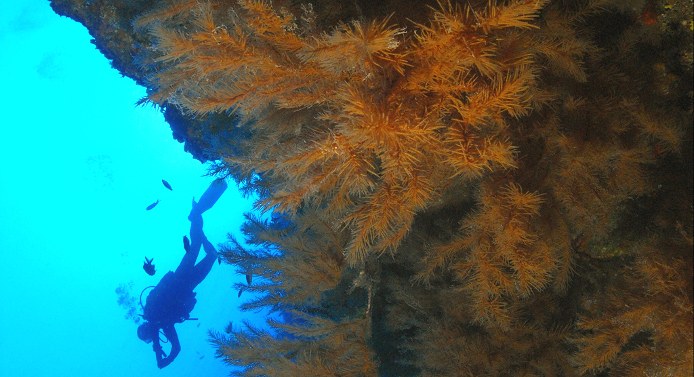Two van containers full of “rubber” were confiscated by Philippines Bureau of Customs officials recently. It turns out that the shipment wasn’t rubber after all. It was found to be black coral, sea turtles, and shells with an estimated value of over P35 million dollars. 134 bundles (21,169 pieces) of “sea fan” black coral and 15 bundles (432 lbs) of “sea whip” black coral were found in the containers including a sea turtle estimated at over 80-100 years of age.
“The Moro Gulf and the Sulu Sea off Cotabato are supposed to be unexplored reef areas but with this collection, we can see that they have also been disturbed,” said Ludivina Labe, a senior marine biologist of the Bureau of Fisheries and Aquatic Resources (BFAR). “It’s like a forest that has been cut down,” Labe said. “One reef complex was decimated.”
It’s estimated that only one colony of black coral is found per acre of sea floor. Based on this figure, Philippine officials estimate that roughly 17,300 acres of reef were decimated of their black coral population. The size of the poached pieces indicates that it took at least 25 years (or more) for these corals to grow to the size that was confiscated as black coral only grow 1 cm per month (4-5 inches per year).
Customs Commissioner Angelito Alvarez states: “(The illicit trade) is being fueled by the demand of the multibillion-dollar marine ornamental industry for exotic decorative species and the increasing popularity of coral-accented jewelry and fashion accessories.”
The current plans are to potentially give some of the contraband to marine biology schools for study while returning the already dead black coral to the ocean.
Officials are still attempting to track down the poachers. The consignee (Exequiel Navarro) of the seized contraband has been charged with violation of the Fisheries Code. Under the Wildlife Resources Conservation and Protection Act, which punishes the destruction of endangered species, Navarro faces up to 12 years imprisonment and P1 million dollars in fine. Black Corals are protected under the Convention on the International Trade in Endangered Species (CITES).
(via Inquirer News and follow-up)









0 Comments